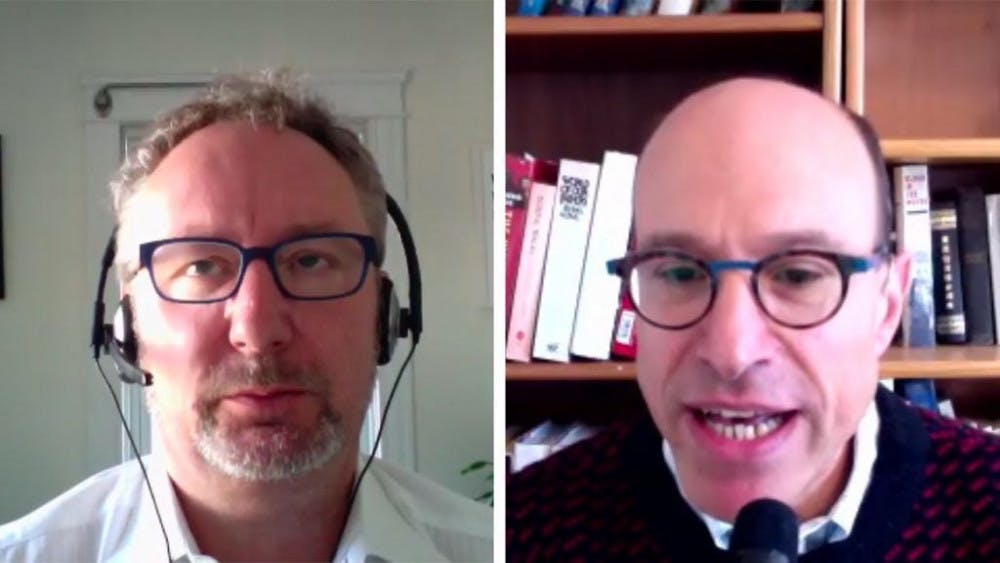In light of the COVID-19 pandemic, the Watson Institute for International and Public Affairs hosted a live virtual conversation Tuesday with Director Edward Steinfeld and Rhodes Center for International Economics and Finance Director Mark Blyth on the economic impacts of the virus.
The conversation focused on the shock the pandemic has delivered to economies worldwide, the short and long-term effects of different government responses and a large scope of non-economic considerations.
Audience members were able to participate in the conversation over Zoom — by typing in or asking questions directly — or by commenting questions on the Youtube Live stream. The recording was later posted to the Watson Institute channel for public viewing.
Members of the Brown community asked their own questions virtually, ranging from how far governments can keep ballooning debt to the usage of surveillance infringing upon data rights.
“This is an enormous challenge, the likes of which we haven’t seen before, and it has prompted right across the world, quite positively, an enormous set of fiscal responses to try and compensate for that shock,” Blyth said during the conversation.
He described how, over the last few weeks, 30 percent of income streams have disappeared from the economy as unemployment mounts, while two-thirds of the workforce must work from home or are otherwise sequestered.
When Steinfeld asked Blyth to compare the economic effects of COVID-19 to the 2007-2008 financial crisis, Blyth acknowledged that they are both “serious crises” but also pointed out their differences.
Blyth characterized the former panic as a “banking crisis,” one which caused the government to implement a period of austerity, or “belt-tightening” measures, to reduce ballooning debt. Instead of austerity measures, the current economic crisis has seen massive stimulus packages passed by the government.
To better understand and possibly predict how different countries will “cushion the (economic) shock” over the long-term, Blyth suggested that we examine governments’ varying public health responses.
Drawing upon the examples of China, western European countries and the United States, each government has approached the pandemic with different strategies fitting to each political system and economic growth model. For instance, China’s powerful state authority allows it to implement a command-and-control approach involving heavy government intervention, buffering the shock, Blyth said.
Ultimately, he stressed that the successes of these varying approaches hinge largely upon the accuracy of viral models, which predict the number of people infected and the length of the pandemic. Economies like that of the United States, which are “optimized to run without buffers,” may be hit harder if the crisis lasts longer than a few months.
Amienne Spencer-Blume ’23 tuned in to the event because the topic “directly gets at the point that many people are experiencing this pandemic not primarily as a health crisis, but rather as a socioeconomic political crisis,” she wrote in an email to The Herald.
The conversation also touched upon the social and cultural effects of the pandemic. Blythe and Steinfeld discussed the role that issues of social trust between citizens and their trust in government play in the efficacy of government responses, regardless of the type of government.
In both democratic South Korea and communist China, “there was a willingness on the part of the public to very rapidly engage in social distancing and stop certain kinds of economic activity,” suggesting that the government’s control of the situation was aided by citizens’ trust, Steinfeld said.
Reflecting on the event, Spencer-Blume wrote, “It was an erudite conversation in which the questions really were equally important as the answers.”
She found “one of the main takeaways” to be that “the virus as an incident provokes political responses that not only reflect basic political structures but (also) sociopolitical cultures,” Spencer-Blume wrote. “These reactions in turn impact different countries’ economies in various ways, affecting the international political economy, even as COVID-19 itself is oblivious to borders.”
The Watson Institute held the conversation live to promote interactivity, Steinfeld told The Herald. “We really care about our community, and we believe that the best kind of education and learning is social and multi-directional. Even beyond our immediate faculty experts, there’s so much expertise in the community, among students, staff, faculty (and) audiences.”
While members of the University community face new, challenging situations working away from campus, Steinfeld finds optimism in the cooperative spirit and active participation in live events like this one.
“The enthusiastic engagement of students and other professors demonstrates the appreciation for this kind of event,” Spencer-Blume wrote.
Despite the challenges COVID-19 poses, Steinfeld hopes to continue live, virtual conversations to engage the community. “We don’t necessarily have to have the same amount of events, but a steady stream of events, and different kinds of events, interactive ones, that not only keep people informed but keep them in a scholarly discussion,” he said.

ADVERTISEMENT




